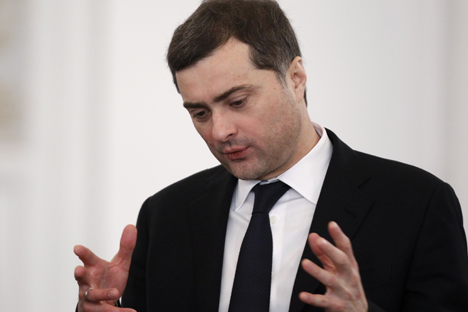
Surkov cited “a practically unencumbered registration of political parties.” . Source: Reuters
In his lecture at the London School of Economics (LSE), Russian Deputy Prime Minister, Vladislav Surkov, commented on the changes made to the political system in 2011 and 2012. According to Surkov the system has not collapsed, but has “defeated the opposition,” demonstrating a “long overdue harshness” toward extremists.
To ensure the regime’s continued stable existence, Surkov proposed establishing another major political party to act as a rival to the ruling United Russia.
Surkov was supposed to deliver a lecture entitled "Innovation in Russia: Plans and Prospects" at the LSE. Instead, he invited questions from the students. The first question to Surkov, who is in charge of innovation in the Russian government, was about a corruption scandal at the Skolkovo foundation.
Skolkovo Vice President, Alexey Beltyukov, is being investigated for embezzlement after allegedly handing A Just Russia Party State Duma deputy, Ilya Ponomarev, $750,000 for work performed for the foundation. Surkov said that instances of theft had been reported in “major multinational companies” too, but “nobody had shut them down.”
The Vice Premier characterized Skolkovo as one of “the cleanest projects in terms of abuse,” adding that “not a single fact of fraud” had been proven.
“If some sort of a pig ruins your reputation, that doesn’t mean that your whole business should be flushed down the drain. All you have to do is get rid of this pig and keep working,” Surkov said.
The first political question concerned stagnation in Russia, but Surkov answered it tersely, explaining that when Western leaders rule for several terms in a row, “nobody asks such questions.”
He was also asked about a poll conducted by the Russian opinion research firm Levada Center, according to which most Russians agree with the characterization of the United Russia party, which holds a majority in the State Duma and is led by Prime Minister, Dmitry Medvedev, as a “party of crooks and thieves” (a label coined by the famous oppositionist, Alexei Navalny).
In particular, Surkov was asked if this was a sign that the political system built by 2011 was no longer working.
The Vice Premier, who was in charge of domestic policy in the presidential administration until the end of 2011, assured the audience that “the system wasn’t broken,” while changes made to it “don’t mean its liquidation.”
When the system “faced certain challenges,” such as the mass protests of late 2011 and early 2012, “it adapted.” It “demonstrated a long overdue harshness toward extremists, and finally those who thought it possible to beat up policemen were subjected to well-deserved punishment.”
As another sign of the regime’s adaptation, Surkov cited “a practically unencumbered registration of political parties.” He also said that it would take the establishment of a second “large party to compete seriously with United Russia” to improve the system. “Perhaps such a party even needs some help to get established,” Surkov said.
He first mentioned the need to create a party that would serve as a “second foot” to step on back in March 2006 in a speech to activists of Russia’s Party of Life (which merged with Rodina and the Party of Pensioners in 2007 to create A Just Russia).
But as Aleksei Chesnakov, Director of the Center for Current Politics, recalled, A Just Russia had failed to play the role of a second ruling party.
“They started competing with United Russia right from the start instead of eliminating their rivals in the leftist ideological field,” he said. United Russia itself “has been increasingly leaning toward a left-of-center ideology.” With this in mind, either a second party “must be more liberal, or United Russia must return to the liberal field.”
Chairman of the Executive Board of the Center for Political Technologies, Boris Makarenko, recalled that during his time in the Kremlin, Surkov himself “was building a strictly vertical political system.” A top-down structure cannot be a fully fledged political party, the expert noted, adding that United Russia was only a “function of the executive branch.”
“The regime will remain unstable until power is transferred to the opposition,” said Secretary of the Communist Party of the Russian Federation Central Committee, Sergei Obukhov. But the government is only “window dressing” and “feigning opposition” instead.
All rights reserved by Rossiyskaya Gazeta.
Subscribe
to our newsletter!
Get the week's best stories straight to your inbox